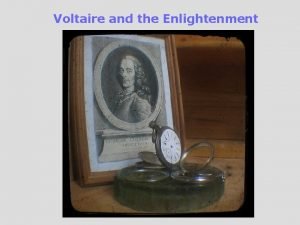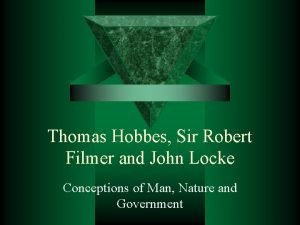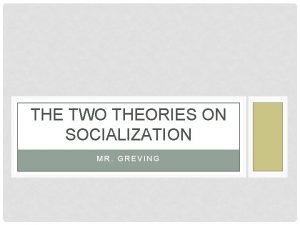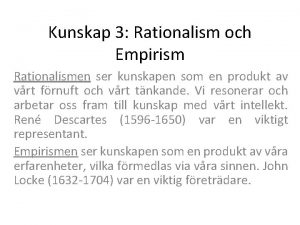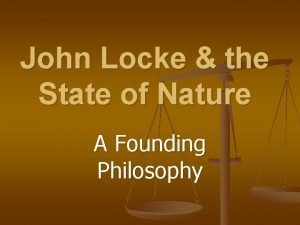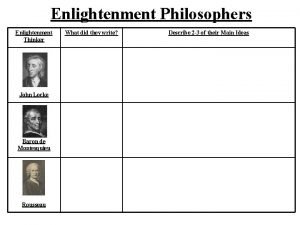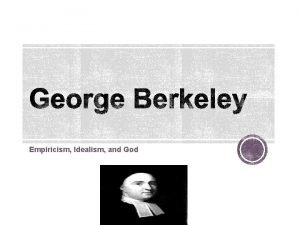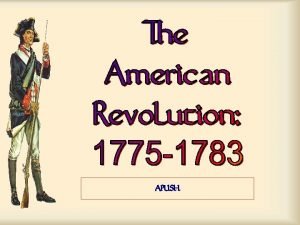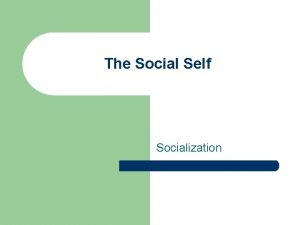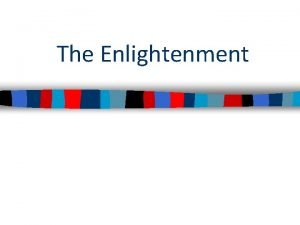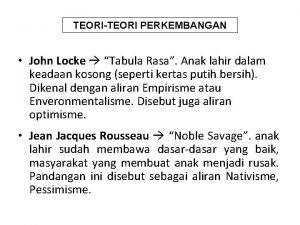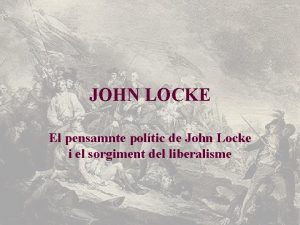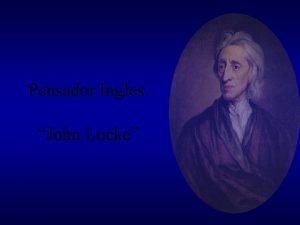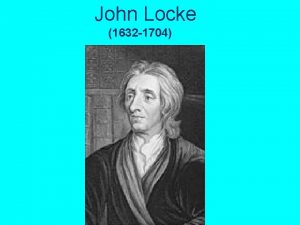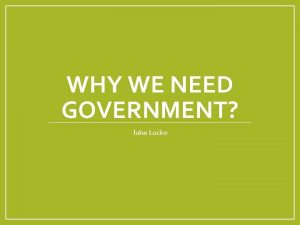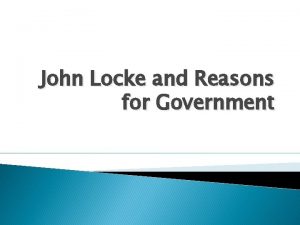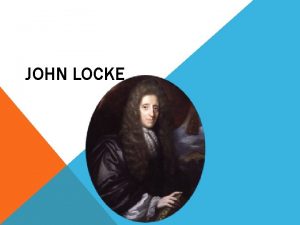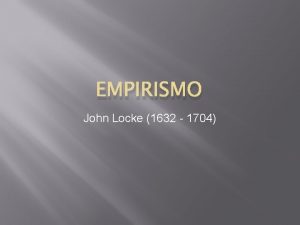History of Law Presentation John Locke Kitti allison















- Slides: 15

History of Law Presentation John Locke Kitti, allison, vincent, alex

Who -John Locke (English Philosopher and Political Theorist) -Born August 29, 1632 and died at the age of 72 -Greatly influenced by the works of Plato, Aristotle, and Thomas Hobbes -Awarded a bachelor ‘s degree in 1656 and a master’s degree in 1658

What Influenced the development of Epistemology - Studies the nature, methods, limitations, and validity of knowledge and belief And Political Philosophy - The study of state, government, politics, liberty, justice, property, right law, and enforcement of a legal code by authority

Where Defined “natural rights” as life, liberty (freedom of thought, speech, and religion), and property, which we still have today. Defined the divine rights of kings In his Two Treaties of Government, he recommended that if the king violated the natural rights of the people, then the people were justified in rebelling and in replacing the unjust government with one that would respect their rights

When Locke’s work, particularly the concepts of liberty, later influenced the written works of Thomas Jefferson and other Founding Fathers of the United States. In particular, the United States Declaration of Independence drew upon many 18 th century political ideas, derived from the works from Locke. Liberty: identifies the condition in which and individual has the ability to act according to his or her own will.

The Two Treaties of Government (1690)

Liberalism: Definition: Political philosophy that emphasizes human rights and equality of opportunity. www. undp. am/publications/gender/wsr/Z+++/Glossary. htm

The Two Treaties of Government Liberalism Rule of Law Natural Rights The Principle on Natural Equality

The Rule of Law: “A state also of equality, wherein all the power and jurisdiction is reciprocal, no one having more than another; there being nothing more evident than that creatures of the same species and rank, promiscuously born to all the same advantages of nature and the use of the same faculties, should also be equal one among another without subordination or subjection” (Two Treaties of Government 1690)

The Rule of Law: The Principle of Natural Equality: banishes the traditional claims of priests, kings, and nobles to rule on the basis of their alleged natural superiority and inheritance of power replaces it with government by consent of the individuals of society (citizens)

Natural Rights: What are natural rights? Natural rights are those rights that we are entitled to as humans Rights to life Rights to liberty Freedom of thought Freedom of speech Freedom of religion Rights to property

Natural Rights: These rights are taken granted today; but, In the 1690 s, this was a relatively new idea and was not recognized until John Locke and his philosophies became well thought through

Natural Rights: Why are natural rights important? Guarantee stability and protect the people from forms of unjust government It is up to the state or the government to protect these rights so that people do not rebel against them Before society can exist, natural rights must be established

Influences The Declaration of Independence (1776) Thomas Jefferson was inspired by John Locke’s natural-law theory Jefferson wrote that certain truths (natural rights) are universal and can be discerned through reason In Locke’s Two Treaties of the Government he wrote that if in the case of an unjust king who violated the people, the people would be able to rebel and replace the king with one that would not violate them. This was also put through the Declaration from Jefferson who believed the people, if violated, would be able to replace the old government with one that would serve respect.

Influences American and French Revolutions Locke’s views had influence over Jefferson, a draftsperson of the Declaration of Independence Locke’s views on natural rights helped in the American Revolution as many women and minorities in slave labour used his theories This in turn helped in the French Revolution because the French supported the American movement for independence.
 Pollák kitti
Pollák kitti Ideas of voltaire
Ideas of voltaire Hobbsian
Hobbsian Thomas hobbes human nature
Thomas hobbes human nature Stages of greving
Stages of greving John locke empirism
John locke empirism Drawing tablit
Drawing tablit John locke nature nurture
John locke nature nurture John locke ideas
John locke ideas Baron de montesquieu main ideas
Baron de montesquieu main ideas Alir locke
Alir locke Locke y el liberalismo
Locke y el liberalismo Two treatises of government apush
Two treatises of government apush Self socialization definition
Self socialization definition John locke enlightenment ideas
John locke enlightenment ideas Orthogenesis adalah
Orthogenesis adalah

